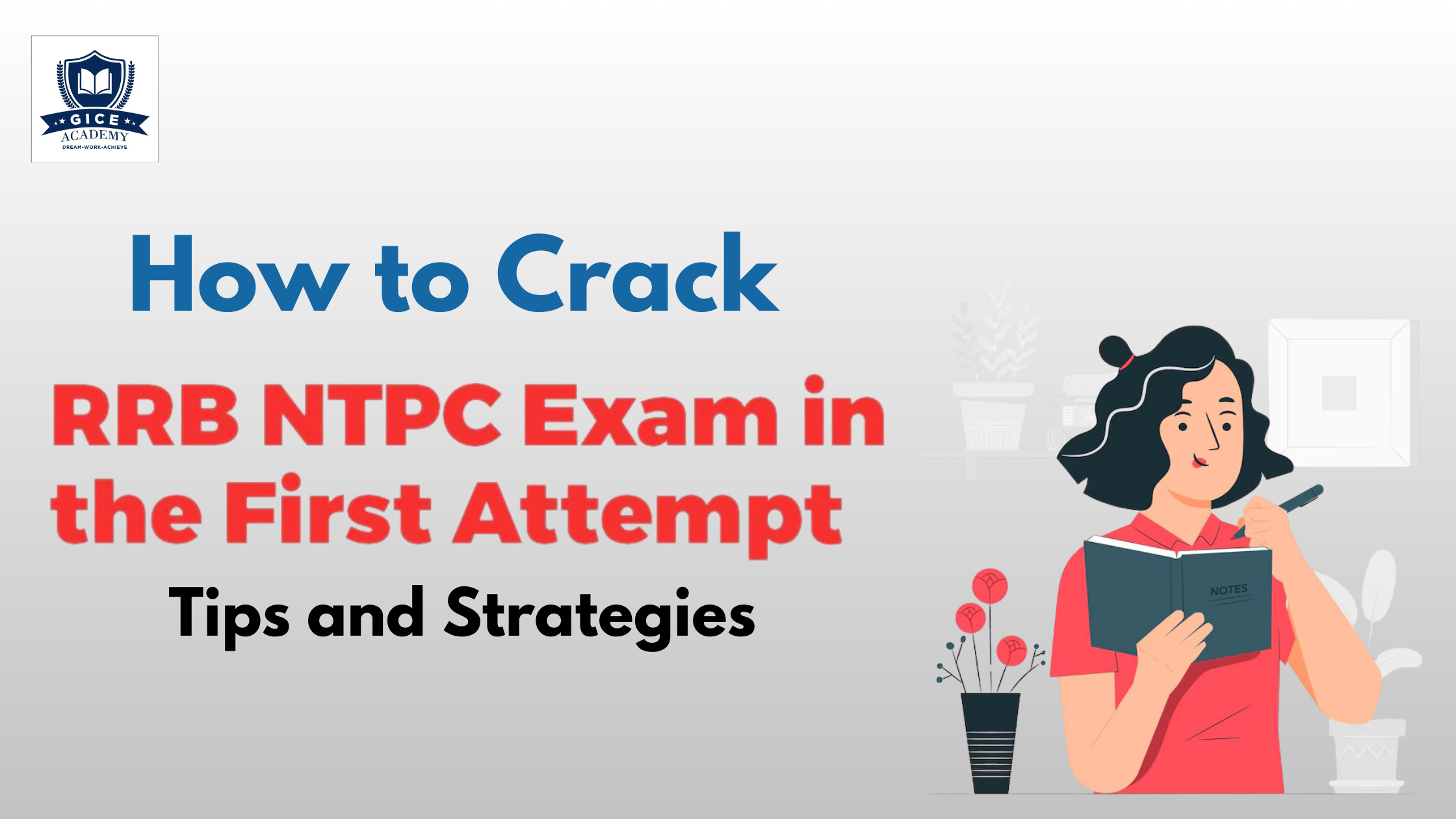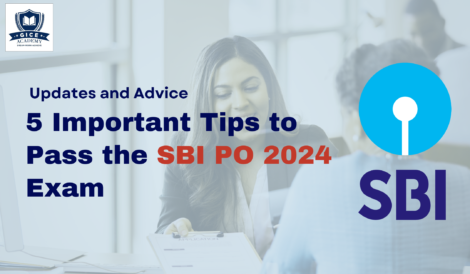Table of Contents
The Railway Recruitment Board (RRB) NTPC exam is one of the most sought-after competitive exams in India. Every year, lakhs of aspirants aim to secure a position in Indian Railways by clearing this exam. The NTPC (Non-Technical Popular Categories) exam offers a variety of job roles, making it highly competitive. Cracking the RRB NTPC exam in the first attempt requires a solid preparation strategy, focus, and dedication.
In this blog, we will discuss effective tips and strategies to help you prepare for the RRB NTPC 2024 exam. From understanding the exam pattern to making a study plan, we will cover everything you need to know to ace the exam in your first attempt.
Understanding the RRB NTPC Exam Pattern and Syllabus
Before diving into preparation, it is essential to understand the RRB NTPC exam pattern and syllabus. Knowing the structure of the exam helps you focus on the important topics, manage time effectively, and align your preparation strategy with the exam’s requirements.
RRB NTPC Exam Pattern
The RRB NTPC exam is conducted in multiple stages. Here’s a breakdown of each stage:
- Computer Based Test (CBT 1)
- Duration: 90 minutes (120 minutes for PwBD candidates)
- Total Questions: 100 (1 mark each)
- Mathematics: 30 questions
- General Intelligence & Reasoning: 30 questions
- General Awareness: 40 questions
- Negative Marking: 1/3rd mark will be deducted for every wrong answer.
- Computer Based Test (CBT 2)
- Duration: 90 minutes (120 minutes for PwBD candidates)
- Total Questions: 120 (1 mark each)
- Mathematics: 35 questions
- General Intelligence & Reasoning: 35 questions
- General Awareness: 50 questions
- Negative Marking: 1/3rd mark for every wrong answer.
- Typing Skill Test (TST)
- Candidates who qualify for CBT 2 are required to undergo the Typing Skill Test.
- Typing Speed Requirements:
- Minimum 30 words per minute (WPM) in English or 25 WPM in Hindi.
- Document Verification (DV)
- Shortlisted candidates from the Typing Skill Test are called for Document Verification to confirm their eligibility for various posts.
RRB NTPC Syllabus
The syllabus for RRB NTPC revolves around three key subjects, each tested in both CBT 1 and CBT 2:
- Mathematics
- Topics: Simplification, Number System, Percentage, Ratio and Proportion, Time and Work, Time and Distance, Simple and Compound Interest, Algebra, Profit and Loss, Mensuration, Data Interpretation, etc.
- General Intelligence & Reasoning
- Topics: Analogies, Coding-Decoding, Puzzles, Blood Relations, Venn Diagrams, Statement and Assumptions, Syllogism, Logical Reasoning, Data Sufficiency, and more.
- General Awareness
- Topics: Current Affairs (National and International), Indian History and Freedom Struggle, Indian Polity and Governance, Economy, Geography, General Science, Environmental Issues, and Railway-related facts.
Preparation Tips for RRB NTPC 2024
Cracking the RRB NTPC exam on your first attempt requires a structured approach and consistent efforts. Here are some effective preparation tips that can help you make the most of your study time and improve your chances of success.
1. Create an Effective Study Plan
A well-structured study plan is the foundation for success in any competitive exam. To prepare for RRB NTPC 2024, it is crucial to:
- Set clear goals: Break down the syllabus and set daily or weekly targets. Make sure you cover all three subjects—Mathematics, General Intelligence & Reasoning, and General Awareness—over the course of your preparation.
- Allocate time wisely: Assign time slots to each subject based on your strengths and weaknesses. For instance, if you are good at reasoning but weak in mathematics, dedicate extra hours to improving math skills.
- Revise regularly: Revision is key to retaining concepts. Allocate 1-2 hours daily to revising what you’ve already learned.
2. Choose the Right Study Materials
Having the right resources is essential for exam preparation. Here are some recommended books and study materials for the RRB NTPC exam:
- Mathematics:
- Quantitative Aptitude by R.S. Aggarwal
- Fast Track Objective Arithmetic by Rajesh Verma
- General Intelligence & Reasoning:
- A Modern Approach to Verbal and Non-Verbal Reasoning by R.S. Aggarwal
- Lucent’s Reasoning by Arihant Experts
- General Awareness:
- Lucent’s General Knowledge by Dr. Binay Karna
- Regularly follow a daily newspaper or monthly magazines like Pratiyogita Darpan for current affairs.
Online resources such as YouTube channels, educational websites, and RRB NTPC preparation apps also offer free mock tests, practice papers, and tips that you can incorporate into your study plan.
3. Practice Mock Tests and Previous Year Papers
Mock tests and previous year papers are an integral part of exam preparation. They help you understand the exam pattern, identify common question types, and improve time management. Here’s how to make the most of them:
- Take regular mock tests: Schedule weekly or bi-weekly mock tests to track your progress. Time yourself to get used to the exam conditions.
- Analyze your performance: After each mock test, review the areas where you made mistakes and revise those topics.
- Solve previous year question papers: Practicing past RRB NTPC papers will help you get a sense of the difficulty level and frequently asked questions.
4. Focus on Weak Areas
Identifying and improving your weak subjects or topics is a vital part of preparation. Use the following techniques:
- For Mathematics: If you struggle with certain topics like algebra or geometry, dedicate extra time to those chapters. Break down complex problems into smaller steps for better understanding.
- For General Awareness: Stay updated with daily current affairs and focus on static GK, especially topics related to Indian Railways, History, and Geography.
- For Reasoning: Practice puzzles and logical reasoning questions regularly to enhance speed and accuracy.
5. Consistency is Key
Consistent efforts will take you a long way in your RRB NTPC preparation. Regular study, daily revisions, and periodic mock tests will help you stay on track. Avoid long gaps in your preparation, as it can disrupt your learning process.
Subject-Wise Strategy for RRB NTPC
To perform well in the RRB NTPC 2024 exam, it is important to adopt a tailored strategy for each subject. By focusing on key topics and practicing regularly, you can improve your accuracy and speed in all sections.
1. Mathematics
The Mathematics section is both scoring and time-consuming. With proper practice, this section can significantly boost your overall score. Here’s how to prepare for it:
Important Topics:
- Number System
- Simplification
- Percentage
- Ratio and Proportion
- Time and Work
- Time, Speed, and Distance
- Profit and Loss
- Simple and Compound Interest
- Algebra
- Geometry and Trigonometry (for CBT 2)
- Data Interpretation
Preparation Tips:
- Master the basics: Ensure that your fundamentals are strong in topics like percentages, ratios, and algebra. Focus on understanding the underlying concepts rather than just memorizing formulas.
- Daily practice: Mathematics requires continuous practice. Solve problems daily from the recommended books like Quantitative Aptitude by R.S. Aggarwal or online sources.
- Shortcut techniques: Learn shortcut methods for quick calculations, especially for topics like simplifications and data interpretation. This will save time during the exam.
- Focus on accuracy and speed: Set a time limit for each question while practicing, and gradually work on solving questions faster without compromising accuracy.
2. General Intelligence & Reasoning
The Reasoning section is one of the most scoring sections in RRB NTPC. It tests your logical thinking and problem-solving abilities. With consistent practice, you can easily tackle this section.
Important Topics:
- Analogies
- Coding-Decoding
- Puzzles
- Blood Relations
- Syllogism
- Venn Diagrams
- Data Sufficiency
- Statement and Conclusions
- Seating Arrangement
- Direction Sense
- Series (Number and Alphabet)
Preparation Tips:
- Start with easy topics: Begin your preparation with simple topics like analogies, coding-decoding, and series. Gradually move to complex topics like puzzles and seating arrangements.
- Practice reasoning puzzles: These are common in both CBT 1 and CBT 2. Regular practice is crucial to improve speed. Books like A Modern Approach to Verbal and Non-Verbal Reasoning by R.S. Aggarwal provide a good collection of such puzzles.
- Improve logical thinking: Focus on sharpening your logical reasoning by practicing questions from previous year papers and mock tests. Logical reasoning questions often have a set pattern, so practice identifying the patterns quickly.
3. General Awareness
The General Awareness section is crucial because it has the highest weightage in both CBT 1 (40 marks) and CBT 2 (50 marks). This section tests your knowledge of current affairs, history, geography, and general science.
Important Topics:
- Current Affairs (last 6-12 months)
- Indian History and Freedom Struggle
- Indian Polity and Governance
- Indian Economy
- General Science (Physics, Chemistry, Biology)
- Geography
- Environmental Issues
- Important facts about Indian Railways
Preparation Tips:
- Stay updated with current affairs: Read a reliable newspaper (such as The Hindu or Indian Express) daily. You can also refer to monthly magazines like Pratiyogita Darpan or online current affairs apps and websites.
- Focus on static GK: Pay attention to topics like Indian history, geography, and railway-related facts. These are frequently asked in the exam.
- Revise regularly: General awareness is vast, so regular revision is necessary. Make short notes on important facts and revise them at least once a week.
- Use quizzes and apps: Online GK quizzes and apps can help you assess your knowledge quickly and efficiently. These platforms also provide updated content for current affairs.
Time Management and Mock Test Strategy
Time management plays a crucial role in successfully clearing the RRB NTPC exam. With limited time and multiple questions to answer, effective time management will help you maximize your score. Additionally, regular mock tests allow you to simulate exam conditions and refine your preparation.
1. Importance of Time Management During Preparation
Effective time management during the preparation phase can enhance your productivity and ensure you cover all topics. Here’s how to make the most of your study time:
- Create a Timetable: Divide your time among all subjects. Allocate more time to your weaker sections without neglecting the ones you are strong at. Make sure to include short breaks to avoid burnout.
- Prioritize Topics: Identify high-weightage topics in each subject and focus on mastering them first. For instance, topics like current affairs in General Awareness and percentage in Mathematics are frequently asked, so prioritize these in your study plan.
- Daily and Weekly Targets: Set daily goals to cover certain topics or practice a specific number of questions. At the end of each week, review your progress and make adjustments to your study plan as needed.
- Use Time Blocks: Study in focused time blocks of 1-2 hours, followed by short breaks. This technique, known as the Pomodoro method, improves concentration and productivity.
2. Mock Test Strategy
Mock tests are essential for gaining confidence and understanding the exam pattern. They also help you track your progress and highlight areas that need more attention. Here’s how to incorporate mock tests into your preparation:
- Start Early: Begin taking mock tests once you’ve covered around 50-60% of the syllabus. Starting early gives you enough time to identify your weak areas and improve them before the exam.
- Simulate Exam Conditions: Take mock tests in a quiet environment, similar to the actual exam conditions. This will help you get accustomed to the pressure and time limits of the exam.
- Analyze Your Performance: After each mock test, review your performance in detail. Focus on the questions you answered incorrectly or left unanswered. Identify if the mistakes were due to lack of knowledge, misunderstanding, or time pressure.
- Focus on Speed and Accuracy: Mock tests help you balance speed and accuracy. Don’t rush through questions; instead, work on maintaining accuracy while gradually increasing your speed.
- Take Sectional Tests: If you are weak in a particular subject, take sectional tests to improve your performance. For example, if you find mathematics challenging, focus on mathematics-only tests to build confidence.
3. Time Management During the Exam
When it comes to the actual exam, managing time efficiently is crucial. Here are some tips for handling time effectively during the RRB NTPC exam:
- Attempt Easy Questions First: Begin with questions that you can solve quickly and accurately. This will build confidence and leave more time for difficult questions later.
- Time Allocation Per Section: For CBT 1 (90 minutes) and CBT 2 (90 minutes), divide your time across sections. For instance, spend approximately:
- 25-30 minutes on Mathematics
- 25-30 minutes on General Intelligence & Reasoning
- 30-35 minutes on General Awareness
Adjust these times based on your strengths.
- Skip Time-Consuming Questions: If you find yourself stuck on a question, move on to the next one. You can return to skipped questions at the end if time permits.
- Avoid Guesswork: Since the exam has negative marking (1/3rd for each incorrect answer), avoid random guessing. Answer only when you are reasonably sure of the solution.
Last-Minute Preparation and Exam Day Tips
As the RRB NTPC exam approaches, your focus should shift towards revision, time management, and maintaining a positive mindset. Here are some last-minute preparation and exam day tips to help you stay calm and perform effectively.
1. Last-Minute Revision Strategies
In the final week before the exam, your focus should be on revising key concepts rather than learning new topics. Here’s how you can plan your last-minute revision:
- Review Important Formulas and Concepts: For Mathematics, create a list of important formulas, shortcuts, and key concepts. Go through them regularly to ensure they stay fresh in your mind.
- Revise Key Topics in General Awareness: Make short notes for current affairs and static GK topics. Focus on high-yield areas such as important events of the last 6-12 months, Indian history, and geography. Don’t forget to revise railway-related facts and developments.
- Solve Previous Year Papers: Solving the previous year’s papers in the last few days helps you get a feel for the types of questions that are likely to appear. It also reinforces your understanding of frequently tested topics.
- Take Quick Mock Tests: Instead of full-length mock tests, focus on sectional or mini mock tests during the last few days. This will keep your mind sharp without causing unnecessary fatigue.
2. Stay Calm and Confident
Stress and anxiety can affect your performance, so staying calm is important. Here are a few techniques to help you stay composed:
- Practice Relaxation Techniques: Take short breaks to relax your mind. You can try meditation, deep breathing exercises, or short walks to reduce stress.
- Avoid Overloading: Don’t overwhelm yourself by trying to learn new topics at the last moment. Instead, focus on strengthening what you’ve already studied.
- Get Adequate Sleep: A fresh mind is crucial for performing well on the exam day. Ensure you get at least 7-8 hours of sleep the night before the exam.
- Eat a Balanced Diet: Eat light, nutritious meals before the exam. Avoid junk food or heavy meals that may cause discomfort.
3. Exam Day Tips
On the day of the exam, managing your time and stress levels effectively can make a big difference. Here are some exam-day strategies:
- Arrive Early at the Exam Centre: Make sure to reach the exam center well ahead of time. This will give you ample time to complete any formalities and avoid last-minute stress.
- Bring All Required Documents: Double-check that you have your admit card, a valid photo ID, and any other necessary documents required for the exam.
- Read the Instructions Carefully: Before starting the exam, carefully read all the instructions on the screen. This will help you avoid unnecessary mistakes or misunderstandings.
- Start with Easy Questions: Begin the exam by solving the questions you find easiest. This boosts your confidence and leaves more time for tougher questions later.
- Manage Time Effectively: Keep track of the time and ensure that you are on schedule to complete all sections. If you get stuck on a difficult question, skip it and return to it later.
- Avoid Guesswork: Remember that incorrect answers result in negative marking (1/3rd mark deduction). Only attempt questions where you are reasonably confident of the answer.
4. What to Avoid on Exam Day
There are a few common mistakes that candidates make on the exam day. Here’s what to avoid:
- Don’t Panic: Even if you encounter a difficult question, don’t panic. Stay calm and move on to the next question if needed.
- Avoid Rushing Through: While time management is important, don’t rush through questions. Read each question carefully before answering to avoid making avoidable mistakes.
- Don’t Forget the Basics: Simple errors in reading or marking answers can lead to losing marks. Double-check your work if time permits.
FAQ
1. What are the best books for RRB NTPC exam preparation?
Here are some recommended books for RRB NTPC:
Mathematics: Quantitative Aptitude by R.S. Aggarwal
General Intelligence & Reasoning: A Modern Approach to Verbal and Non-Verbal Reasoning by R.S. Aggarwal
General Awareness: Lucent’s General Knowledge and daily newspapers for current affairs
2. How can I improve my speed in solving math problems?
To improve speed:
Focus on shortcut techniques for calculations.
Practice with a timer to simulate exam conditions.
Solve as many mock tests and previous year papers as possible to build confidence.
3. Is it necessary to take mock tests for RRB NTPC?
Yes, mock tests are crucial for improving speed, accuracy, and time management. They help you get familiar with the exam pattern and identify weak areas to work on before the exam.
4. What is the minimum typing speed required for the Typing Skill Test?
The minimum typing speed required is:
30 words per minute (WPM) in English, or
25 words per minute (WPM) in Hindi.
5. How many hours should I study daily to crack RRB NTPC in the first attempt?
You should aim to study for at least 4-6 hours a day. Make sure to cover all subjects, practice regularly, and revise concepts frequently.




